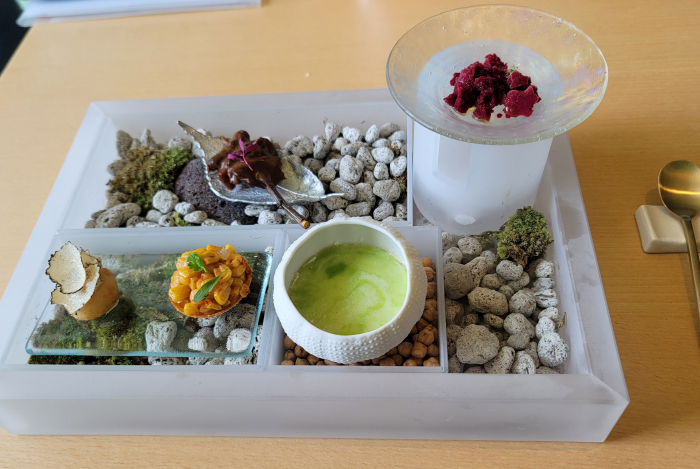
One of the dishes available at Forest Kitchen by Nongshim Veganism, or the practice of abstaining from any animal or animal byproducts, is taking the food and beverage (F&B) industry by storm. Even though vegans account for only 5% of the South Korean population, industry heavyweights are expecting the plant-based population to grow consistently. South Korea's F&B conglomerates poured capital into two main categories: development of alternative meat and establishment of all-vegan restaurants. PLANT-BASED MEATPackaged food manufacturer Fresheasy Co. announced Thursday it will expand its meal kit business by incorporating plant based meat into its vegan brand Hello Veggie. Fresheasy’s subsidiary Tasty9 launched the Hello Veggie brand earlier this year to meet the growing demand for healthier and more sustainable food options.The company hopes to utilize the brand to get more traction to its business-to-business (B2B) commissions, such as providing for school lunches; as well as to the business-to-customer (B2C) orders. In the latter half of this year, Fresheasy will introduce home meal replacement (HMR) kimchi and doenjang stew with vegan meat products. The two types of stew are the peninsula’s most common at-home dishes. The company is also developing HMRs for catering enterprises and casual dining franchises. Shinsegae Food is also bullish on alternative meat products. The food business subsidiary of the Shinsegae Group launched vegan meat brand Better Meat last July and introduced plant based sliced ham as its first product. In addition to using it in catering services, Shinsegae also uses the new product to make the “Plant Ham & Rucola Sandwich,” one of the select vegan options at Starbucks Coffee Korea Co., one of its affiliates. The café franchise sells about 2,000 of those per day nationwide. Starbucks Korea's vegan sandwich Plant Ham & Rucola (Courtesy of Starbucks Korea) DINING OUTIn addition to R&D, South Korea’s food conglomerates are also investing in marketing to educate the public that lack of animal product does not translate to lack of flavor. Nongshim Co. opened its first vegan restaurant named Forest Kitchen at Lotte World Mall on May 27.Its competitor Pulmuone Co., for its part, opened Plantude at Starfield COEX Mall.While both establishments’ menu are all certified vegan, Nongshim mainly serves Western cuisine while Pulmuone offers Korean fusion dishes.“The operation will center around the goal of introducing the new culinary culture,” Kim Sung-hwan, the managing director of the restaurant business division at Nongshim, told The Korea Economic Daily. Interior of Plantude restaurant by Pulmuone located in COEX The market for non-dairy milks is also increasing. The Korea Agro-Fisheries & Food Trade Corp. forecasts South Korea’s milk alternative market, including that of the traditional soy milk, to grow at an annual average of 9% from 43.1 billion won ($35 million) in 2020 to 66.8 billion won by 2025. CJ CheilJedang Corp. on Thursday launched Altive, a plant based milk brand. Just six months prior, the F&B chaebol unveiled the all-vegan PlanTable brand. Six millennials at CJ CheilJedang joined forces to form a corporate VC for the dairy-free initiative.“Compared to the United States or Europe where many brands compete in the non-dairy beverage market, the South Korean market is still in the nascent stage,” a CJ employee said. “We will expand Altive’s portfolio by replacing our various dairy products with vegan alternatives.” By Kyeong-je Hanhankyung@hankyung.comJee Abbey Lee edited this article.
Most Read